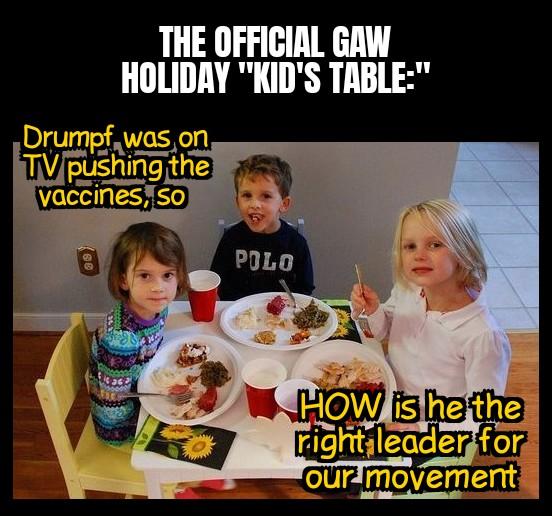
INTRODUCING! The official GAW Holiday "Kid's Table!" Who's sitting there this holiday season? All the little children who aren't big enough to sit at the adult's table, yet! 😁
(media.greatawakening.win)
🧠 These people are stupid!

The fact that it has produced more adverse reactions per million doses administered than all other vaccines combined over the past 30 years.
These rates would only be made justifiable if the efficacy rates were also high enough to offset these high risks of adverse reactions. But as we've seen with the numerous reports of waning efficacy falling to as low as 32% (against the Delta variant), and now with the emergence of a new omicron variant, followed by the subsequent push for boosters, it can be reasonably inferred that the effectiveness of these vaccines fall substantially short of coming anywhere near being able to justify the rates of adverse reactions being produced.
Well this would definitely be explained in the difference between the variants that have emerged. Essentially, the vaccine can be compared to a mousetrap.
A mousetrap is something that you put out to catch mice that are infesting your home. For a while, this will work not only in killing the mice that come into your home, but will also keep them from nesting, making new baby mice, and then those baby mice spreading to your neighbor's homes. It's not going to work on EVERY mouse, but they can certainly help curb a mouse infestation by a good margin.
However, over time, you may start getting rats that come through.
Rats are larger, smarter, and aren't as prone to be killed by mousetraps, may still get into your home, nest, and make rat babies that go into your neighbor's homes. Rats can be assumed as the variant of COVID.
Now, does this mean the mousetraps don't work? Of course not! Mouse traps DO work, just not for rats, and not for every mouse, so then you have to get new traps that are better suited for the rats that are coming through.
(I know that rats and mice are different species entirely, but I'm just trying to make it easier to grasp)
Your analogy is a fairly good one I'll concede. However it doesn't seem to have any way of accounting for the adverse reactions produced.
Perhaps if by setting up a mouse trap, came the mandatory and very real risk of irradiation which made you more susceptible to cancers and radiation sickness, then this would make for a more reasonable analogy.
Well, it can. The person setting the traps, in many cases, will at times set the trap off on their own fingers when putting them out. That can be considered a small sacrifice for the overall benefit of setting the traps. For the vast majority of people getting the vaccine, the adverse effects are mild (sore arm, feeling crummy the next day). This is the case with any vaccine, as those feelings are your body reacting to the dormant diseases being injected into your arm.
The interesting thing about being sick is that your fever, the chills, the cough, those aren’t exactly the effects the virus/bacteria are having on your body. That’s actually the protocol your body is taking to fight the sickness inside you. Coughing is the attempt to expel the virus. Phlegm is something your body produces to capture and smother the virus/bacteria (similar to how boogers are your body producing substances that capture dirt and then prevent it from being breathed into your lungs). When you get a shot, you’re getting mild/dormant strains of the virus, essentially giving your body a playbook on how to attack this specific strain of an illness. The mild side effects (generally felt) can be considered your body’s trial run. Unfortunately it makes you feel like shit lol.
What you are describing (and very well to your credit), are what vaccines were originally defined as before the pandemic. The definition I grew up having learned, was that a vaccine involved the introduction of a weakened or killed form of a virus, designed to prompt the body's defenses to identify and defeat the handicapped virus strain--and in doing so provides immunity as the immune system records and remembers the characteristics of the virus for future potential encounters.
However, as we've come to learn on this board, the definition of "vaccine" has since been altered to where an inoculation need only to provide the effect of decreasing symptoms in the event the person does catch the virus, in order to be considered a "vaccine", and immunity seems to be almost unnecessary under this new definition.